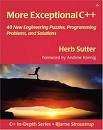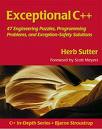Olivier Langlois's blog
Category: C++
07/31/07
More Exceptional C++
Mr. Sutter's books biggest strength to my opinion is that they bring together a bunch of original advanced C++ topics that you cannot find anywhere else. This book has its share of very original content but I feel like the ratio original content vs topics that you can find in other books is lower in this book than with the other books of the serie. The most interesting section in this book in my opinion is the one on exception safety and the less original section is the one on generic programming and STL as you can find much of the information contained in this section in other books such as Effective STL from Scott Meyer or C++ Template from David Vandervoorde and Nicolai M. Josuttis.
07/30/07
Exceptional C++: 47 Engineering Puzzles, Programming Problems, and Solutions
This book presents advices more or less in the same format than books from the Effective C++ serie. What is similar is that topics are divided in 47 small items of few pages each. The difference is that the author first ask questions to the readers or propose exercises and encourage the reader to put down the book and to take the time to think about the problem and then come back to read his answer. This format is more or less original as I have seen something similar in Tom Cargill's C++ Programming Style book.
I have read this book pretty fast which is a good sign of my interest in a book but in the same time this book did not leave me, at first, a strong impression that will make me remember this reading for a long time. It is hard for me to say exactly why but I think that it is because most items focus on very small details of C++. Some of these problems are very hard and probably is an indication that the book targeted audience is advanced C++ users which is not a bad thing by itself but I was not convinced that mastering these small details actually has a high impact on someone programming skills.
It took few months to let the wisdom contained in this book to sink in and I have found myself many times, in my day to day programming, confronted to problems where the material of this book helped to make wise design decisions. So now, I think that this book is very valuable for anyone that has mastered the C++ programming language and is ready to master tougher C++ issues.
07/11/07
Practical Statecharts in C/C++: Quantum Programming for Embedded Systems
First prior to reading this book, I was finding the title unattractive. I did not know what statecharts were and what Quantum programming was. By reading this book, I have learn that statecharts were special finite state machines that could be built by deriving them from more general FSM similar to how OO classes inheritance works.
Quantum is the name of the presented framework in the book. The title is misleading because I though that Quantum programming was some weird new programming technique that I was not aware and did not care to learn. I think that it is important to find catchy names to market software but one negative point of the book, is that the author spend way too much pages to describe similarities between quantum physics and his framework to justify the name 'Quantum' for his framework. Programmers are not all quantum physics enthusiasts!
Concerning the book content, the author presents the C++ classes implementing the statecharts framework and a set of classes to make threads driven by statecharts collaborate together by communicating with message queues. It is an interesting reading and there are many places where you can learn good programming tricks by seeing the author code. However, I am not sure that I would want to use the framework because it is complex. Let me clarify what I mean. It is not the framework that is complex but implementing statecharts is complex. I believe that the author made his code as simple as possible to implement statecharts. Personally, I still have to work on a problem where a simple FSM will not be enough.
The best feature of the book is its presentation of a base class to implement FSMs and compares it with traditional table based FSMs and a OO FSM like the one presented in the Design Pattern book and it is highly convincing that his FSM implementation is superior to the other 2 in size, performance and ease of maintenance. Another interesting topic is the author method to emulate C++ in C. You cannot beat the real thing with an emulation but when you have to go write C and you are used to do OO programming, this method might become handy.
I would say that for the FSM pattern and the C++ in C methodology alone, even if it represents a small proportion of pages in the book, it justifies the purchase of this book.
06/15/07
The Annotated C++ Reference Manual
Yes it is outdated as it does not cover the latest features added to the standard. However it does describe in great details the core language and it is still the most detailed book about C++ to my knowledge after the C++ standard document text itself. Even the latest edition of 'The C++ programming language' book does not provide as much details about the language itself.
The Design and Evolution of C++
I have red this book for the first time 4 years ago. What I remember is that, at that time, I got few interesting informations here and there but overall the reading was more tedious than enjoyable. For some reasons, I have reread this book for a second time and perhaps because I could now relate my C++ programming experience with what the book explains, I have found it much more enjoyable to read this time. So my opinion is that to really get the maximum out of this book, you really need intimate knowledge and experience with the C++ programming language. I would not recommend this book for someone that has just started to use C++. Also, you have to know what the book is about. Do not expect to get practical knowledge to improve your C++ skills because you will not get much. The only exception is that this book made me curious about the "intersection" rule from Andrew Koenig about overloaded functions and made me look into the Annotated C++ reference manual to know more about it. This book is more about the C++ history and how and why certain design decisions have been taken about the language. If this is what you are expecting, you will like the book.
Olivier Langlois's blog
I want you to find in this blog informations about C++ programming that I had a hard time to find in the first place on the web.
| Sun | Mon | Tue | Wed | Thu | Fri | Sat |
|---|---|---|---|---|---|---|
| << < | > >> | |||||
| 1 | 2 | 3 | 4 | 5 | 6 | |
| 7 | 8 | 9 | 10 | 11 | 12 | 13 |
| 14 | 15 | 16 | 17 | 18 | 19 | 20 |
| 21 | 22 | 23 | 24 | 25 | 26 | 27 |
| 28 | 29 | 30 | ||||
Search

Categories
Olivier Langlois's blog
- AAC (2)
- Book reviews (12)
- C++ (24)
- Code Optimization (4)
- Compiler (3)
- Fractal (2)
- Linux/UNIX (3)
- Multithreading (3)
- Software security (7)
- TCP/IP (8)
- Web (1)
- Windows programming (19)
- C++ (28)
- tutorials (4)
- General (10)
- Hardware reviews (2)
- Linux (12)
- Recommended books (4)
- C++ (20)
- Code Optimization (2)
- Compiler (3)
- Fractal (2)
- Linux/UNIX (1)
- Multithreading (2)
- Rare out of print (3)
- Software security (5)
- TCP/IP (7)
- Windows programming (16)
- Software reviews (0)
- TCP/IP (8)
- Video games (4)
Archives
- January 2016 (1)
- September 2015 (1)
- July 2015 (1)
- June 2015 (1)
- May 2015 (1)
- December 2013 (3)
- September 2013 (1)
- May 2013 (8)
- April 2013 (1)
- December 2010 (1)
- August 2010 (1)
- June 2010 (1)
- More...
Misc
 XML Feeds
XML Feeds
What is RSS?
Who's Online?
- Guest Users: 2
 BOOKS i'm reading
BOOKS i'm reading








